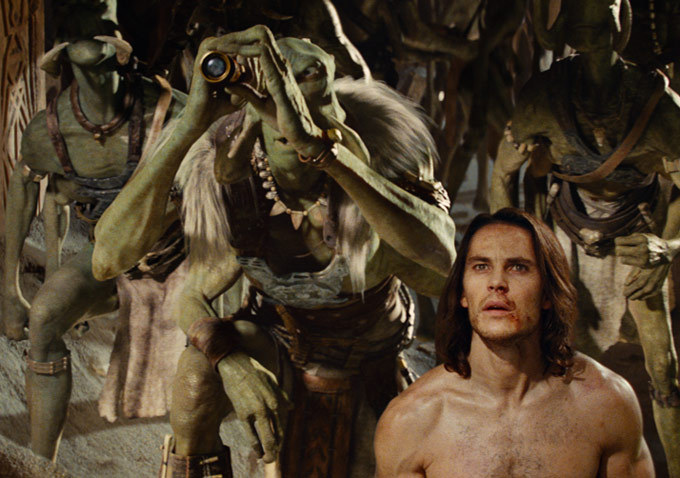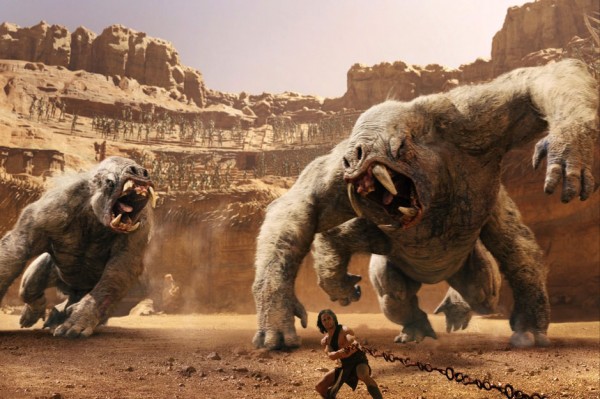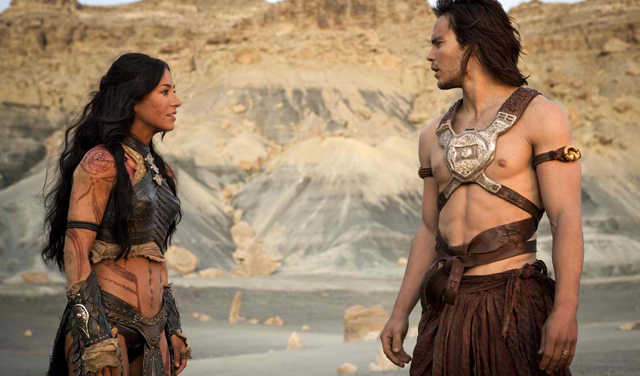John Carter Review
Steven's Rating: 7/10
Player Affinity Composite Rating: 6.5/10
(2 reviews total)
When we think of science fiction, we so often think about the future. We expect it to stretch our imaginations in ways we never thought possible with groundbreaking concepts beyond our current understanding.
John Carter appears to aspire to that level, yet in spite of the film’s hefty price tag, use of latest in motion-capture technology, 3D conversion and all the other tell-tale signs of an ambitious blockbuster,
John Carter is classic, old-school sci fi/fantasy at heart.
And that’s the way it should be. After all, the source material comes from Edgar Rice Burroughs’
A Princess of Mars, a pulp story nearly 100 years old. Rather than give us a John Carter for the 21st Century, director Andrew Stanton gives us John Carter as made possible by the technological advancements of the 21st Century.

It starts with a vision, and that’s what Stanton (and all Pixar disciples) brings to the table. One can imagine the concept art he used to sell this movie to Disney didn’t change much from inception to the film canister. Anyone with unadulterated love for science fiction will be captivated by the
John Carter’s production design. Especially in terms of costume and the big set pieces, the film has that Roman-inspired sci-fi look reminiscent of
Flash Gordon and in some cases
Star Wars.
As with most classical science fiction, the story deals almost exclusively in archetypes. Captain John Carter (Taylor Kitsch) is a Civil War veteran who at the story’s beginning is dead. He has willed and entrusted his journal to his nephew, a fictionalized version of Burroughs (Sabara), the contents of which explain all that’s happened to him over the years, including how he ended up on Mars. Transported there mysteriously while prospecting for gold in Arizona, Carter becomes a near-prophetic hero to the planet’s race of green creatures called Tharks, but also saves a “red” woman named Dejah Thoris (Lynn Collins), who is a princess that begs of his help to end a brutal war.

The story and script maintains its composure throughout, something at which science-fiction films often fail. It starts like pulp and ends like pulp rather than aspiring to be above the material. Consequently,
John Carter does little to appeal to anyone but a true sci-fi nerd; it asks us to embrace this fantastical world on Mars (or I should say Barsoom), just as Carter the character works his way through his interplanetary transplant rather than freaking out about it. Stanton and co-writers Mark Andrews and Michael Chabon (the novelist) spare us all the inane dialogue about how weird everything is on this planet. Carter just accepts it, and fans of this film will be the ones who follow his example.
The scope and scale of the film feels quite close to
Avatar, as both were about visual wonder and stuck to basic storytelling.
John Carter only loses points in terms of the quantity and intensity of the action sequences and the depth of character. Kitsch and Collins make for likable leads and you believe the emotions they feel, but they’re undeniably cookie-cutter.
Some of the side characters, including Tars Tarkas (Willem Dafoe) and Sola (Samantha Morton) show potential for some emotional pull, but it’s all short-lived as the story is constantly on the move to the next locale or sequence. The personal moments between characters are reserved for exposition and expanding the lore of Barsoom. Again, great for geeks, but I can’t imagine it will please much of anyone else.

Simply,
John Carter is for nostalgists. Instead of being your modern science-based science fiction, this is the kind steeped in fantasy. It will make many recall the first time they experienced “Star Wars” or any similar film or television show that crafted its own world or universe. Stanton provides no shortage of things to marvel at, a variety of people, places and vehicles bound to capture the imaginations of younger moviegoers and gratify those who used to be those younger moviegoers.
There was a time when
John Carter would have been a major hit and blown the minds of everyone who saw it. Science fiction has just evolved to the point that this kind of a story captures a specific time in our storytelling history rather than opening our eyes to the possibility of the future. That’s the difference between
John Carter and
Avatar, for one thing. So as much as Stanton and Disney have used the advances in special effects to tell this story in a way that it never could before and does so quite well,
John Carter offers a very specific type of entertainment best for a niche audience.
Rating: 7/10
 John thought:
John thought: "It's hard to believe a film so skillfully crafted and brimming with so many ideas could elicit such a blah reaction. But this is
John Carter. Director Andrew Stanton's live-action debut is a hodgepodge of epic battles, clunky dialogue, interesting mythology, and trite romance. Much has been made of the film's massive $250 million budget (not including marketing expenses), but now having seen the film, it's hard to argue with the end result. It's debatable whether
John Carter actually works, but the only evidence in its favor is Stanton's jaw-dropping scope. It wipes away much of the sour taste left by the film's pretty dreadful screenplay and manages to make
John Carter something that, while not completely involving, is entertaining enough to get a pass. If only the spectacle was coupled with a soul, it could have been really special."
Rating: 6/10
 It starts with a vision, and that’s what Stanton (and all Pixar disciples) brings to the table. One can imagine the concept art he used to sell this movie to Disney didn’t change much from inception to the film canister. Anyone with unadulterated love for science fiction will be captivated by the John Carter’s production design. Especially in terms of costume and the big set pieces, the film has that Roman-inspired sci-fi look reminiscent of Flash Gordon and in some cases Star Wars.
As with most classical science fiction, the story deals almost exclusively in archetypes. Captain John Carter (Taylor Kitsch) is a Civil War veteran who at the story’s beginning is dead. He has willed and entrusted his journal to his nephew, a fictionalized version of Burroughs (Sabara), the contents of which explain all that’s happened to him over the years, including how he ended up on Mars. Transported there mysteriously while prospecting for gold in Arizona, Carter becomes a near-prophetic hero to the planet’s race of green creatures called Tharks, but also saves a “red” woman named Dejah Thoris (Lynn Collins), who is a princess that begs of his help to end a brutal war.
It starts with a vision, and that’s what Stanton (and all Pixar disciples) brings to the table. One can imagine the concept art he used to sell this movie to Disney didn’t change much from inception to the film canister. Anyone with unadulterated love for science fiction will be captivated by the John Carter’s production design. Especially in terms of costume and the big set pieces, the film has that Roman-inspired sci-fi look reminiscent of Flash Gordon and in some cases Star Wars.
As with most classical science fiction, the story deals almost exclusively in archetypes. Captain John Carter (Taylor Kitsch) is a Civil War veteran who at the story’s beginning is dead. He has willed and entrusted his journal to his nephew, a fictionalized version of Burroughs (Sabara), the contents of which explain all that’s happened to him over the years, including how he ended up on Mars. Transported there mysteriously while prospecting for gold in Arizona, Carter becomes a near-prophetic hero to the planet’s race of green creatures called Tharks, but also saves a “red” woman named Dejah Thoris (Lynn Collins), who is a princess that begs of his help to end a brutal war.
 The story and script maintains its composure throughout, something at which science-fiction films often fail. It starts like pulp and ends like pulp rather than aspiring to be above the material. Consequently, John Carter does little to appeal to anyone but a true sci-fi nerd; it asks us to embrace this fantastical world on Mars (or I should say Barsoom), just as Carter the character works his way through his interplanetary transplant rather than freaking out about it. Stanton and co-writers Mark Andrews and Michael Chabon (the novelist) spare us all the inane dialogue about how weird everything is on this planet. Carter just accepts it, and fans of this film will be the ones who follow his example.
The scope and scale of the film feels quite close to Avatar, as both were about visual wonder and stuck to basic storytelling. John Carter only loses points in terms of the quantity and intensity of the action sequences and the depth of character. Kitsch and Collins make for likable leads and you believe the emotions they feel, but they’re undeniably cookie-cutter.
Some of the side characters, including Tars Tarkas (Willem Dafoe) and Sola (Samantha Morton) show potential for some emotional pull, but it’s all short-lived as the story is constantly on the move to the next locale or sequence. The personal moments between characters are reserved for exposition and expanding the lore of Barsoom. Again, great for geeks, but I can’t imagine it will please much of anyone else.
The story and script maintains its composure throughout, something at which science-fiction films often fail. It starts like pulp and ends like pulp rather than aspiring to be above the material. Consequently, John Carter does little to appeal to anyone but a true sci-fi nerd; it asks us to embrace this fantastical world on Mars (or I should say Barsoom), just as Carter the character works his way through his interplanetary transplant rather than freaking out about it. Stanton and co-writers Mark Andrews and Michael Chabon (the novelist) spare us all the inane dialogue about how weird everything is on this planet. Carter just accepts it, and fans of this film will be the ones who follow his example.
The scope and scale of the film feels quite close to Avatar, as both were about visual wonder and stuck to basic storytelling. John Carter only loses points in terms of the quantity and intensity of the action sequences and the depth of character. Kitsch and Collins make for likable leads and you believe the emotions they feel, but they’re undeniably cookie-cutter.
Some of the side characters, including Tars Tarkas (Willem Dafoe) and Sola (Samantha Morton) show potential for some emotional pull, but it’s all short-lived as the story is constantly on the move to the next locale or sequence. The personal moments between characters are reserved for exposition and expanding the lore of Barsoom. Again, great for geeks, but I can’t imagine it will please much of anyone else.
 Simply, John Carter is for nostalgists. Instead of being your modern science-based science fiction, this is the kind steeped in fantasy. It will make many recall the first time they experienced “Star Wars” or any similar film or television show that crafted its own world or universe. Stanton provides no shortage of things to marvel at, a variety of people, places and vehicles bound to capture the imaginations of younger moviegoers and gratify those who used to be those younger moviegoers.
There was a time when John Carter would have been a major hit and blown the minds of everyone who saw it. Science fiction has just evolved to the point that this kind of a story captures a specific time in our storytelling history rather than opening our eyes to the possibility of the future. That’s the difference between John Carter and Avatar, for one thing. So as much as Stanton and Disney have used the advances in special effects to tell this story in a way that it never could before and does so quite well, John Carter offers a very specific type of entertainment best for a niche audience. Rating: 7/10
Simply, John Carter is for nostalgists. Instead of being your modern science-based science fiction, this is the kind steeped in fantasy. It will make many recall the first time they experienced “Star Wars” or any similar film or television show that crafted its own world or universe. Stanton provides no shortage of things to marvel at, a variety of people, places and vehicles bound to capture the imaginations of younger moviegoers and gratify those who used to be those younger moviegoers.
There was a time when John Carter would have been a major hit and blown the minds of everyone who saw it. Science fiction has just evolved to the point that this kind of a story captures a specific time in our storytelling history rather than opening our eyes to the possibility of the future. That’s the difference between John Carter and Avatar, for one thing. So as much as Stanton and Disney have used the advances in special effects to tell this story in a way that it never could before and does so quite well, John Carter offers a very specific type of entertainment best for a niche audience. Rating: 7/10
 John thought: "It's hard to believe a film so skillfully crafted and brimming with so many ideas could elicit such a blah reaction. But this is John Carter. Director Andrew Stanton's live-action debut is a hodgepodge of epic battles, clunky dialogue, interesting mythology, and trite romance. Much has been made of the film's massive $250 million budget (not including marketing expenses), but now having seen the film, it's hard to argue with the end result. It's debatable whether John Carter actually works, but the only evidence in its favor is Stanton's jaw-dropping scope. It wipes away much of the sour taste left by the film's pretty dreadful screenplay and manages to make John Carter something that, while not completely involving, is entertaining enough to get a pass. If only the spectacle was coupled with a soul, it could have been really special." Rating: 6/10
John thought: "It's hard to believe a film so skillfully crafted and brimming with so many ideas could elicit such a blah reaction. But this is John Carter. Director Andrew Stanton's live-action debut is a hodgepodge of epic battles, clunky dialogue, interesting mythology, and trite romance. Much has been made of the film's massive $250 million budget (not including marketing expenses), but now having seen the film, it's hard to argue with the end result. It's debatable whether John Carter actually works, but the only evidence in its favor is Stanton's jaw-dropping scope. It wipes away much of the sour taste left by the film's pretty dreadful screenplay and manages to make John Carter something that, while not completely involving, is entertaining enough to get a pass. If only the spectacle was coupled with a soul, it could have been really special." Rating: 6/10